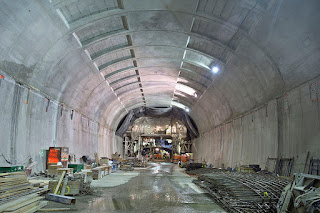America's Temporal Berlin Wall
Monday, March 21, 2022
Climate-change catastrophist Alan Cole posits his theory about [w]hy America can't build quickly anymore, opening with the following:
Much later, he notes the following coincidence, which is amusing when one considers that the environmentalist movement accounts for both the problem and the frustration:Stripe CEO Patrick Collison has a hobby: he curates a list of examples of "people quickly accomplishing ambitious things together." Sadly, of his examples from the physical world -- like ports and skyscrapers and railroads -- most come from before 1970.
Image by Metropolitan Transportation Authority of the State of New York, via Wikimedia Commons, license.
For each impressive example of speedy construction from the early or mid-20th century, Collison includes a beleaguered project from today's world for the sake of contrast: for example, the New York Subway system opened with 28 stations in 1904, just four and a half years after the first contract was awarded. By contrast, the 2017 Second Avenue subway opening, with just three stations, took seventeen years. [link omitted, bold added]
At best, this is an annoyance that wastes billions of dollars and years worth of time. At worst -- at least, if you agree with climate change [catastrophists] -- it's the end of the world. Rep. Alexandria Ocasio-Cortez (D-NY) believes in an urgent need for greener infrastructure, at any cost.Not being a conservative, my desire to indulge in Schadenfreude or "own the libs" is quite limited. So, yes, it is humorous in a very narrow context to imagine this central planner stopped in her tracks by the very mechanisms her fellow travelers have put in place.
"The world is going to end in 12 years if we don't address climate change," she lashed out at critics in 2019, "and your biggest issue is how are we gonna pay for it?" [Many, like myself, see the biggest issue as the wholesale violation of individual rights such central planning agendas necessarily entail. --ed]
Forget how we pay for it, for a moment. The bigger problem is that urgency just isn't there, money or no money. Ocasio-Cortez represents parts of Queens and the Bronx, where you might imagine public transit would be part of the green infrastructure mix. But new subway stops take decades, and are scarcely built anymore. Queens hasn't gotten a new subway station since October 1989, the month she was born. The Bronx hasn't gotten one since May 1941. [bold added, link omitted]
But the fact remains that the problem -- correctly diagnosed at the political level by Full Stack Economics as a "dispersed [regulatory and legal] power structure filled with veto points that lends itself to ... paralysis" -- has been preventing America from building such vital infrastructure as nuclear power plants, highways, and oil refineries for quite some time.
It is tempting to imagine that greens might get behind efforts to streamline the regulatory apparatus so Americans can build big things again, but recall that these are the same people who demand wind power or hydro and then complain about windmills killing birds or try to dismantle the dams.
That said, the fact that this issue is coming up is a good thing: Reasonable people need to discuss this issue and work towards a solution, and not because of the latest prediction of planetary doom: Our lives, standard of living, and ability to defend ourselves all stand to be compromised at the least if we continue to accept this state of affairs.
If the Berlin Wall showed the real-time difference between (semi-)capitalism and central planning, this glance across American history does just as well, although over time. It makes it clear that American industry has been paralyzed by environmental regulations and an out-of-control court system for quite some time -- and that we are running out of time to avoid some painful consequences.
-- CAV


No comments:
Post a Comment